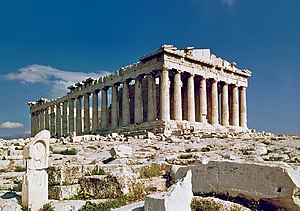
| Part of a series on the |
| Culture of Greece |
|---|
 |
| People |
| Languages |
| Mythology |
| Cuisine |
| Festivals |
| Art |
| Part of a series on the |
| Culture of Cyprus |
|---|
 |
| History |
| Languages |
| Mythology |
| Cuisine |
| Festivals |
| Religion |
| Art |
| Literature |
| Music |
| Sport |
The culture of Greece has evolved over thousands of years, beginning in Minoan and later in Mycenaean Greece, continuing most notably into Classical Greece, while influencing the Roman Empire and its successor the Byzantine Empire. Other cultures and states such as the Frankish states, the Ottoman Empire, the Venetian Republic and Bavarian and Danish monarchies have also left their influence on modern Greek culture.
Modern democracies owe a debt to Greek beliefs in government by the people, trial by jury, and equality under the law. The ancient Greeks pioneered in many fields that rely on systematic thought, including biology, geometry, history,[1] philosophy, and physics. They introduced important literary forms as epic and lyric poetry, history, tragedy, and comedy. In their pursuit of order and proportion, the Greeks created an ideal of beauty that strongly influenced Western art.[2]